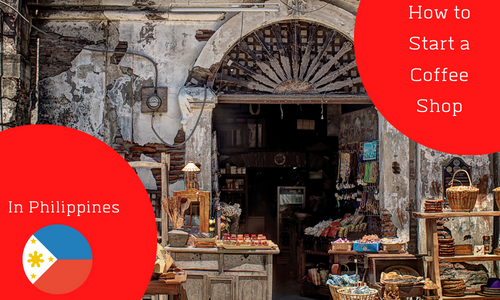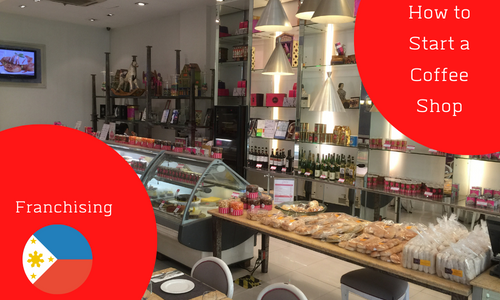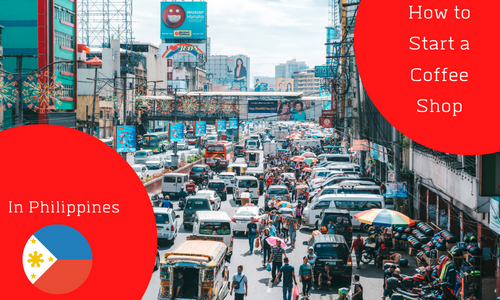Complete Guide On How to Start a Coffee Shop Business in the Philippines

The Philippines is a country with a thriving coffee culture, making it an ideal place to open a coffee shop. Many factors contribute to the success of a coffee shop, including a well-developed business plan, effective marketing strategies, and cost-effective operations. Here are ten essential things to consider to help you start a successful coffee shop business in the Philippines.
**Before moving down the list of things to consider to start your coffee business, we will like to invite you to join us for an upcoming workshop and panel discussion by leading experts from tertiary institutions. 👇

Free workshop - collaboration with Skills future Singapore and Temasek Polytechnic. With full access to free market reports.
Learn more about this Selling Food Online workshop.

Type of Coffee Shop:
There are different coffee shops, such as a traditional café, speciality coffee shops, or a franchise. Determine the kind of coffee shop you want to start and what sets it apart from existing coffee shops in your area.
This would also impact the investment you are putting into this venture. Have a look at the Coffee Shop Start-Up Cost Breakdown and the investment required for the different types of coffee shops.
Business Plan:
A well-written business plan is essential to help you outline your vision, mission, target market, financial projections, and marketing strategies. It should also include a detailed budget plan and a break-even analysis to determine when your coffee shop will become profitable.
To help you start a business plan, start with the exceedingly popular and easy-to-use business model canvas (we included a coffee shop BMC for your download and usage).
You will also find the cafe value proposition canvas to be instrumental in building and readying your business plan.

Location:
Choosing the right place for your coffee shop is vital to its success. Look for areas with high foot traffic near office buildings, shopping centres, or busy streets. Consider factors like parking, accessibility, and visibility when selecting a location.
We have compiled and summarised eight factors that are essential when it comes to the analysing of a coffee shop location. If you are hands-on, use the free research analysis tool to sieve and find up the intent of your audiences at the different locations (e.g. malls, shopping places etc).

Free access to generate and download food and beverage data analytics on (this is the platform that we use to generate all the reports):
- F&B industry (Market Analysis)
- Competitors stats (Competitor Analysis)
- Competitors advert (what they are buying and how much they are spending) and more...
Access this platform (Free)

Interior Design:
Your coffee shop's interior design can significantly impact your customers' experience and perception of your brand. Choose a plan that fits the type of coffee shop you want to create, whether it be cosy and inviting, modern and chic, or eclectic and quirky.
Learn how the interior design, i.e. the size of your service area and your kitchen, impacts your coffee shop rental.

Case Study: Starbucks vs Mcdonalds
This case study sheds light on the importance of location, customer engagement and, most importantly, that having more location need not necessarily meant higher sales revenue.
Read more: Starbucks vs Mcdonalds’ case study.
Coffee Shop Equipment:
Invest in quality equipment to serve top-notch coffee. Consider space, cost, and energy efficiency when choosing your coffee-making equipment.
For a start, consider renting a coffee machine, and learn about the coffee companies' various business models for you to have a coffee machine.
Learn more about the rental of coffee machines.

Coffee Menu:
Offer various coffee options to cater to different tastes and preferences. Experiment with varying brewing methods, such as pour-over, French press, or espresso, and consider offering tea, pastries, and light snacks.
One of the most important of writing a coffee menu is understanding price framing. Read on and learn how to “persuade” customers to buy the items you want to sell by correctly pricing your items.
Here is a look at a mechanic known as price framing.
So, how much do you need to start your coffee shop? It might differ significantly from Makati Greenbelt to Cebu Mactan Island. Use the calculator to start building your dream cafe! 👇
Cost-Effective Operations:
Running a coffee shop can be expensive, so finding ways to cut costs without sacrificing quality is crucial. Consider sourcing your coffee beans directly from local farmers, using energy-efficient equipment, and reducing waste using recyclable materials.
You make money with the net profit margin, deducting your expenses (operation, cost of goods) from your revenue (sales of your coffee shop). So, the more cost-effective your operation is, the better your profit margin.
Read more about how to improve your restaurant operations.

Marketing Strategies:
Effective marketing strategies can attract new customers and build brand awareness. Use social media, local advertising, and referral programs to promote your coffee shop.
One of the most important channels for marketing is the use of social media. This article details how to use social media to grow your influence and positively impact your coffee shop revenue. 👇
Read Digital Marketing strategy for a coffee shop.

Franchising Coffee Shops:
Franchising is another option for starting a coffee shop business in the Philippines. It allows you to leverage an established brand, proven business model, and marketing support to create your own business.
While this is an easy way to start running your own coffee shop business, you need to decide the levels of control you want in your industry. Read about the various pros and cons of franchising coffee shops.
Existing Coffee Shops:
Keep an eye on existing coffee shops in your area to see what works and doesn't. Study their marketing strategies, customer experience, and product offerings to help you create a unique and successful coffee shop business.

In conclusion, starting a coffee shop business in the Philippines requires careful planning and execution. You can increase your chances of success by considering factors such as the type of coffee shop, business plan, location, interior design, equipment, coffee menu, cost-effective operations, marketing strategies, franchising, and existing coffee shops. Remember that success takes time and effort, so be patient and keep striving towards creating a successful coffee shop.
If you enjoyed this guide, check out our other articles and guide similar to “How to Start a Coffee Shop Business in Philippines”. Drop us a message on issues and matters related to starting or managing a cafe or coffee shop.
About US | OCM Profile
OCM (OnCoffeeMakers.com) was started in 2007 with the first webpage about coffee machines. And for a number of years, we focused on helping people find their desired coffee machine (we still are helping folks with that! So, if you are looking for coffee machines for office or restaurants - check out the link).
In 2010, we started getting enquiries on restaurant marketing and we start to help food and beverage brands with their marketing. Below are campaigns and events that we have done over the years:
OCM's campaigns: F&B Marketing Ideas by OCM
OCM's Events: F&B Industry events by or with OCM
Check out this restaurant marketing guide to learn more about the many campaigns and companies we have worked with.
Since then, we have also created many marketing workshops and classes for the F&B industry. Many of these modules are still running in tertiary institutions such as Temasek Polytechnic Skillsfuture Academy and also ITE College East COC classes, below are some snippets of our lectures and workshops:
OCM’s F&B workshops: Food and Beverage Marketing Lectures | Workshops - click to watch classes on customer journey map, JTBD and more.
So, if you are looking for industry practitioners to help you scale your coffee or F&B businesses, do drop us a message or book an appointment. Do also check out our various social media platforms on regular F&B and coffee market updates:
For regular coffee (F&B) related videos: OCM Youtube
For Daily Coffee Inspiration (fun coffee content): OCM IG
For insights into the coffee (F&B) industry: OCM LinkedIN
PS: For the coffee lovers, we continue to share coffee articles (and videos) and have also started a free coffee class section (with free online coffee training supported by coffee partners).